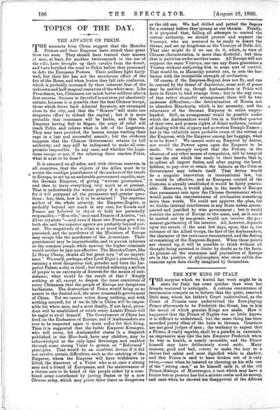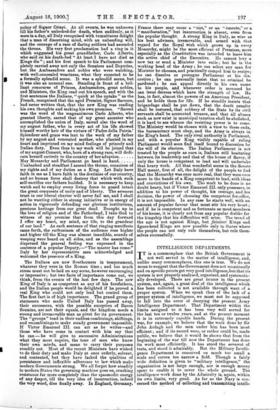THE NEW KING OF ITALY. T HE surprise which we hinted
last week might be in store for Italy has come quicker than even her friends ventured to anticipate. A curious concurrence of testimonies compels us to believe that the quiet, reserved little man, whom his father's Court undervalued, as the Court of Prussia once undervalued the flute-playing Prince afterwards to be Frederick the Great, has in him the metal of which genuine Kings are made. How it happened that the Prince of Naples was so little known it is difficult to understand, but the same thing has been recorded pretty often of the heirs to thrones. Courtiers are not good judges of men ; the tendency to expect that a Prince, if really capable, shall be a paladin in externals, an impressive man like the late Emperor Frederick when he was in health, is nearly incurable, and the Prince himself may have deliberately stood aside. Many reasons, good and bad, concur to make the heir to a, throne feel safest and most dignified while in shadow, and this Prince is said to have broken out of it only twice,—once when he insisted on choosing as his wife one of the " strong race," as he himself calls it, of the old Prince-Bishops of Montenegro, a race which may have a future but at present has but a minute realm and no money, and once when he showed his disapproval of the African policy of Signor Crispi. At all events, he was unknown till his father's unlooked-for death, when suddenly, as it were in a day, all Italy recognised with tumultuous delight that a man of discerning mind, with an unbending will, and the courage of a race of daring soldiers had ascended the throne. His very first proclamation had a ring in it which suggested his great grandfather, Carlo Alberto, who said on his death-bed " At least I have not died as Kings die " ; and his first speech to his Parliament com- pletely carried away not only the Senators and Deputies, but the Ambassadors and nobles who were watching, with well-concealed weariness, what they expected to be a formally splendid scene. It was a splendid scene, but it was also an unusual one. Standing in front of a bril- liant concourse of Princes, Ambassadors, great nobles, and Ministers, the King read out his speech, and with the first sentences the Italians, " quick at the uptake " as the French, recognised that the aged Premier, Signor Sarocco, had never written that, that the new King was reading his own thoughts and making his own promises. "Sacred was the word of the magnanimous Carlo Alberto, who granted liberty, sacred that of my great ancestor who accomplished the union of Italy, sacred also the word of my august father, who in every act of his life showed himself worthy heir of the virtues of 'Padre della Patria.' Splendour and grace was lent to the work of my father by my august and venerated mother, who planted in my heart and imprinted on my mind feelings of princely and Italian duty. Even thus to my work will be joined that of my august Consort, who, born of a strong race, will dedi-
cate herself entirely to the country of her adoption May Monarchy and Parliament go hand in band
Unabashed and steadfast I ascend the throne, conscious of my rights and of my duties as a King. Let Italy have faith in me as I have faith in the destinies of our country, and no human force shall destroy that which with such self-sacrifice our fathers builded. It is necessary to keep watch and to employ every living force to guard intact the great conquests of unity and of liberty. The serenest trust in our liberal charter will never fail me, and I shall not be wanting either in strong initiative or in energy of action in vigorously defending our glorious institutions, precious heritage from our great dead. Brought up in the love of religion and of the Fatherland, I take God to witness of my promise that from this day forward I offer my heart, my mind, my life, to the grandeur of our land." As each sentence of that ringing manifesto came forth, the enthusiasm of the audience rose higher and higher till the King was almost inaudible, sounds of weeping were heard on all sides, and as the assemblage dispersed the general feeling was expressed in the sentence of a popular Deputy,—" The master has come." Italy by her representative men acknowledged and welcomed the presence of a King.
The Italians are now Southerners in temperament, whatever they were in the Roman time ; and too much stress must not be laid on any scene, however encouraging or impressive; but two facts of importance come out, we think, from the events of the last few days. The new King of Italy is as competent as any of his forefathers, and the Italian people would be delighted if he proved a real King who could not only lead but control them. The first fact is of high importance. The grand group of statesmen who made United Italy has passed away, their successors, with the possible exception of Baron Sonnino, are not their equals, and the kingdom needs a strong and irremovable man as pivot for its government. The "groups" tend in their endless combinings, shiftings, and recombinings to make steady government impossible. If Victor Emanuel III. can act as he writes—and those who have come in contact with him say that he can -- he will give to successive Administrations what they most require, the tone of men who know their own minds, and mean to carry their purposes steadily out. Most of the recent Ministers have wished to do their duty and make Italy at once orderly, solvent, and contented, but they have lacked the qualities of persistence and inflexible adherence to law which make modern Governments strong. We all forget how steadily in modern States the governing machine goes on, crushing resistance far more completely than the spasmodic energy of any despot, till the very idea of insurrection, indeed the very word, dies finally away. In England, Germany, France there may occur a "riot," or an " emeute," or a " manifestation," but insurrection is absent, even from the popular thought. A strong King in Italy, as wise as his best advisers, irremovable, and armed with that regard for the Royal wish which grows up in every Monarchy, might be the most efficient of Premiers, more especially as the Constitution was intended to leave him the active chief of the Executive. He cannot levy a new tax or send a Minister into exile ; but he is the working head of the Army ; he can select any man for Minister he chooses, and practically compel him to resign; be can dissolve or prorogue Parliament at his dis- cretion ; he can personally insist that no criminal be pardoned ; he can appeal directly in his own name to his people, and whenever order is menaced he can issue decrees which have the strength of law. He has, in fact, almost the powers of an American President, and he holds them for life. If he steadily insists that brigandage shall be put down, that the death penalty shall be restored, that robbery of the State by its civil servants shall be accounted treason, and that all abuses such as now exist in municipal taxation shall be abolished, it is hard to see whence the resisting power is to come. The Ministry would be chosen with a view to these ends, the bureaucracy must obey, and the Army is always in the King's hand. The only rival authority is Parliament, and with a popular King visibly capable of ruling Parliament would soon find itself bound to discretion by the will of its electors. The Italian Parliament is not trusted by the people as ours is, Italians still hesitating between its leadership and that of the house of Savoy, if Only the house is competent to lead and will undertake that heavy work. All that wonderful scene in the Senate Hall meant, first of all, the delight of the people to find that the Monarchy was once more real, that they were once more in the hands of a King competent to lead, with ideas and convictions of his own. The work to be done is no doubt heavy, but if Victor Emanuel III. only possesses, in addition to his power of thought, his courage, and his decision, the power of choosing the competent for.office, it is not impossible. In any case he starts well, with an amount of popular favour that must stir his very heart ; and if he is competent and as fortunate as most members of his house, it is clearly not from any popular dislike for the kingship that his difficulties will arise. The trend of the age is not against Kings, but faineant Kings and figure-head Kings are now possible only in States where the people can not only rule themselves, but rule them- selves successfully.



































 Previous page
Previous page